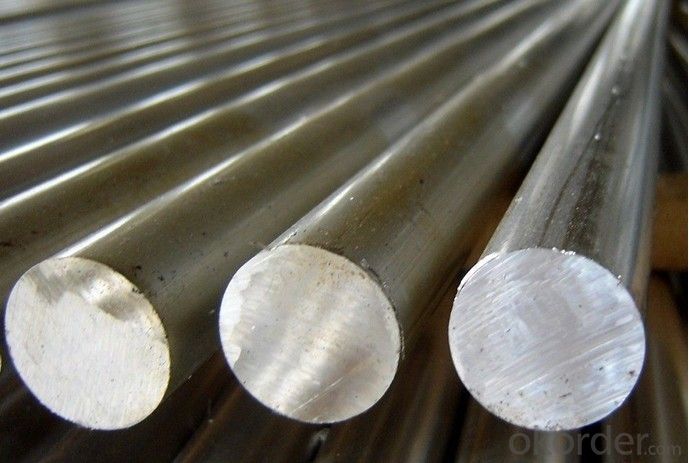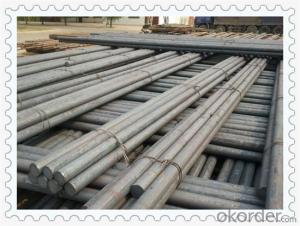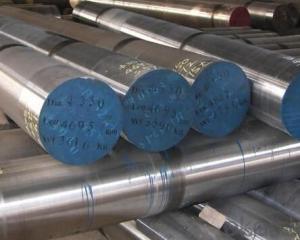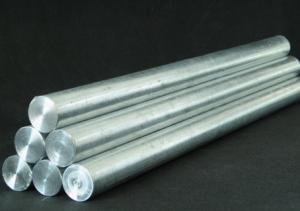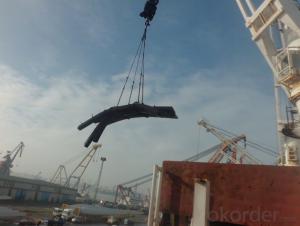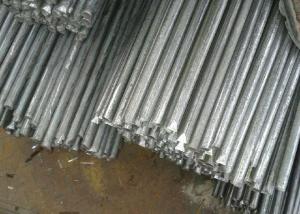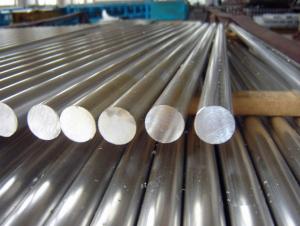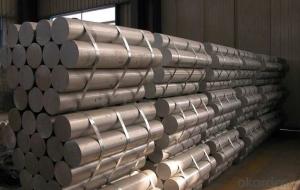Stainless Steel Round Bar for Machine-made Industry,Chemical Industry, Shipping Industry
- Loading Port:
- Qingdao
- Payment Terms:
- TT or LC
- Min Order Qty:
- 10 m.t.
- Supply Capability:
- 10000 m.t./month
OKorder Service Pledge
OKorder Financial Service
You Might Also Like
Stainless Steel Round Bar for Machine-made Industry,Chemical Industry, Shipping Industry
Products Information
1)Dia:2mm-500mm
2)Length:1m,2m,3m,5m,5.8m etc
3)Surface:Bright,Pickling,Black,Polishin
1) Product name: |
duplex stainless steel round bar 2205
|
2) Stardard: | AISI,SUS,GB,JIS,ASTM,DIN etc. |
3) Grade: | 200,300,400series, 201,202,301,304,309S,310S,316,316L,410,430,etc. |
4) Diameter: | 1/4'-4' Length:According to client's requirement |
5) Technology: | Bright, Polished, Turn smooth(Peeled),Brush, Mill, Pickled etc. |
6) Packing: | Export standard package, bundled or be required. The inner size of
container is below: 20ft GP: 5.9m(length) x 2.13m(width) x 2.18m(high) abou
t 24-26CBM 40ft GP: 11.8m(length) x 2.13m(width) x 2.18m(high) about 54C
BM 40ft HG: 11.8m(length) x 2.13m(width) x 2.72m(high) about 68CBM |
7) Payment term: | L/C, T/T, D/P |
8) Quality: | we can offer the certifications of chemical compostion and mechanical property |
9) Application | Machine-made industry, chemical industry, shipping industry architecture,
food industry,household products,and so on.
|
Picture
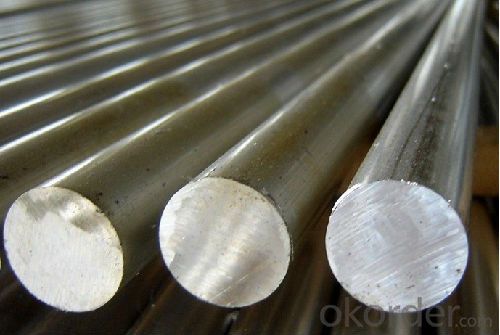
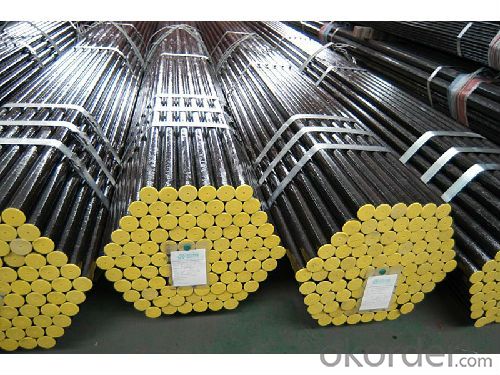
- Q: How are steel round bars stored and transported?
- Steel round bars are typically stored and transported using a variety of methods to ensure their safety and ease of handling. When it comes to storage, steel round bars are often stored in warehouses or outdoor yards. In these facilities, the bars are usually stacked horizontally on racks or placed on steel stands to prevent any damages or deformations. It is important to keep the bars off the ground to avoid contact with moisture and potential rusting. To facilitate transportation, steel round bars are commonly bundled together using steel straps or chains. These bundles are designed to keep the bars tightly secured and prevent any movement during transit. Additionally, the bundles are often labeled with relevant information such as the type of steel, dimensions, and weight to ensure proper identification and handling. When it comes to transportation, steel round bars can be shipped using various modes such as trucks, trains, or ships. Trucks and trains are commonly used for shorter distances, while ships are preferred for longer hauls, especially for international shipments. Depending on the size and weight of the bars, they can be loaded onto flatbed trucks or placed in shipping containers for transportation. During transportation, it is crucial to avoid any potential impacts or mishandling that could cause damage to the bars. Proper securing and bracing techniques are employed to minimize any movement or shifting of the bars in transit. This can include using blocking and bracing materials to prevent the bars from rolling or sliding. In summary, steel round bars are stored in warehouses or outdoor yards and are often bundled together using steel straps or chains. They are transported using trucks, trains, or ships, ensuring proper securing and bracing to prevent damage. By following these storage and transportation practices, steel round bars can be delivered to their destinations safely and efficiently.
- Q: How are steel round bars used in the construction of dams and reservoirs?
- Due to their strength, durability, and versatility, steel round bars are essential components in the construction of dams and reservoirs. These bars, typically made of reinforced steel, play a vital role in reinforcing the concrete structures that make up dams and reservoirs. In dam construction, steel round bars are primarily used as reinforcement in concrete walls and foundations. Strategically placed within the concrete, these bars provide additional tensile strength, preventing cracking and ensuring the structural integrity of the dam. By withstanding the enormous pressure exerted by the water, the reinforcement helps prevent leaks or potential failures. Furthermore, steel round bars are utilized to strengthen the spillway gates and control structures of dams and reservoirs. These gates regulate the flow of water and prevent overflow during heavy rains or floods. By reinforcing these critical areas with steel round bars, engineers guarantee that the gates can endure the forces exerted by the flowing water, maintaining their functionality and preventing potential damage. In addition, steel round bars are used in the construction of penstocks, which are large pipes or conduits that transport water from reservoirs to turbines in hydroelectric power plants. These bars reinforce the penstocks, ensuring they can withstand the high pressure of the water as it flows through and powers the turbines. In conclusion, steel round bars are extensively applied in dam and reservoir construction to enhance the strength and durability of various structural components. Their ability to reinforce concrete walls, foundations, spillway gates, control structures, and penstocks makes them indispensable in ensuring the longevity and stability of these crucial water infrastructures.
- Q: What are the advantages of using free-cutting steel round bars?
- There are several advantages to using free-cutting steel round bars. Firstly, they offer improved machinability, which means they can be easily and efficiently machined into various shapes and sizes without excessive tool wear or power consumption. This leads to increased productivity and reduced manufacturing costs. Additionally, free-cutting steel round bars have excellent chip formation properties, resulting in better surface finish and dimensional accuracy of the machined parts. They also exhibit enhanced surface hardness and wear resistance, making them suitable for applications that require durability and strength. Lastly, these bars are readily available and cost-effective, making them a preferred choice for many industries.
- Q: What is the difference between a centerless ground and a polished steel round bar?
- Both a centerless ground steel round bar and a polished steel round bar are types of steel bars that have undergone different finishing processes, resulting in unique qualities and characteristics. To produce a centerless ground steel round bar, the surface of the steel bar is ground using a specialized machine called a centerless grinder. This process effectively eliminates any imperfections or irregularities on the surface, resulting in a smooth and uniform finish. Additionally, the centerless grinding process ensures that the diameter of the bar remains consistent throughout its length. As a result, centerless ground steel round bars are ideal for applications that require precise dimensions and a smooth surface, such as machining operations or as a base material for further processing. On the contrary, a polished steel round bar is achieved through a polishing process, in which the surface of the steel bar is buffed and polished using abrasive materials. This process enhances the aesthetic appearance of the steel bar, giving it a shiny and reflective surface. Unlike centerless grinding, polishing does not involve the removal of material from the surface, but rather focuses on smoothing and refining it. As a result, polished steel round bars are commonly used in decorative applications, such as architecture, interior design, or as components in high-end furniture. In conclusion, the main distinction between a centerless ground steel round bar and a polished steel round bar lies in the finishing process. Centerless grinding focuses on achieving precise dimensions and a smooth surface, making it suitable for functional applications. On the other hand, polishing aims to enhance the visual appeal of the steel bar, making it more suitable for decorative purposes.
- Q: Are steel round bars suitable for welding?
- Yes, steel round bars are suitable for welding.
- Q: Can steel round bars be used in the manufacturing of power transmission components?
- Yes, steel round bars can be used in the manufacturing of power transmission components. Steel round bars are commonly used in the production of various mechanical and structural components due to their high strength, durability, and versatility. In power transmission systems, components such as shafts, gears, couplings, and spindles are often manufactured using steel round bars. The hardness and toughness of steel make it suitable for withstanding high levels of stress and torque, which are common in power transmission applications. Additionally, steel round bars can be machined and forged into different shapes and sizes, allowing for customization and precise engineering of power transmission components. Overall, steel round bars offer the necessary mechanical properties required for efficient and reliable power transmission in various industries.
- Q: How do you store excess steel round bars?
- To store excess steel round bars, it is important to follow certain guidelines to ensure their longevity and prevent any damage. Here are a few steps you can take: 1. Properly clean and inspect the steel round bars before storage. Remove any dirt, grease, or moisture from the surface to prevent corrosion. 2. Choose an appropriate storage location. Ideally, it should be a dry, well-ventilated area with stable temperatures. Avoid storing the bars in areas prone to moisture, extreme heat, or direct sunlight. 3. Use racks or pallets to store the bars. Stack them horizontally, one on top of another, with enough space between each layer to prevent deformation or bending. 4. If storing the bars outdoors, cover them with a waterproof tarp or protective coating to shield them from rain, snow, and other elements. 5. Avoid placing excessive weight on top of the bars to prevent deformation. Be mindful of any sharp objects or edges nearby that could cause damage. 6. Regularly inspect the stored bars to ensure no signs of corrosion, rust, or other damage. If any issues are detected, take the necessary steps to address them promptly. Remember, proper storage is crucial to preserve the quality and integrity of the steel round bars. By following these guidelines, you can ensure that your excess steel round bars remain in good condition until they are needed for future use.
- Q: What are the advantages of using nickel-chromium-molybdenum alloy steel round bars?
- There are several advantages of using nickel-chromium-molybdenum alloy steel round bars: 1. High strength and durability: Nickel-chromium-molybdenum alloy steel round bars have excellent mechanical properties, including high tensile strength and hardness. This makes them ideal for applications that require a strong and durable material. 2. Corrosion resistance: The addition of nickel and chromium in the alloy steel composition enhances its resistance to corrosion, making it suitable for use in environments where exposure to harsh chemicals or moisture is a concern. This corrosion resistance extends the lifespan of the round bars and reduces the need for frequent replacements. 3. Heat resistance: Nickel-chromium-molybdenum alloy steel round bars can withstand high temperatures without losing their structural integrity. This makes them suitable for applications that involve exposure to extreme heat, such as in the manufacturing of boilers, heat exchangers, and other heat-resistant equipment. 4. Versatility: The nickel-chromium-molybdenum alloy steel round bars can be easily machined and fabricated, allowing for various shapes and sizes to be produced. This versatility makes them suitable for a wide range of applications in industries such as aerospace, automotive, oil and gas, and construction. 5. Fatigue resistance: The alloy composition of nickel-chromium-molybdenum steel enhances its fatigue resistance, making it suitable for applications subjected to cyclic loading or repeated stress. This property ensures that the round bars can withstand prolonged use without experiencing fatigue failure. 6. Weldability: Nickel-chromium-molybdenum alloy steel round bars have good weldability, allowing for easy joining or fabrication processes. This makes them suitable for applications that require welding or other forms of joining, providing flexibility in design and construction. Overall, the advantages of using nickel-chromium-molybdenum alloy steel round bars make them a preferred choice in various industries where strength, durability, corrosion resistance, heat resistance, versatility, fatigue resistance, and weldability are crucial factors for success.
- Q: What are the different types of steel round bar alloys for improved wear resistance?
- Various steel round bar alloys have been specifically developed to enhance wear resistance. These alloys are designed to possess increased hardness and toughness, making them suitable for situations where constant friction or abrasive forces are present. One popular alloy is tool steel, which includes variations such as H13, D2, and A2. Tool steel is renowned for its high hardness, exceptional wear resistance, and good toughness. It finds common usage in applications such as molding and forming tools, cutting tools, and dies. Stainless steel is another alloy utilized for improved wear resistance. Stainless steel round bars are resistant to corrosion and possess strong properties. They are frequently employed in applications like food processing equipment, medical devices, and marine components. Abrasion-resistant steel, also referred to as AR steel, is a distinct type of alloy used to enhance wear resistance. AR steel is specially formulated to endure impacts and abrasion, making it ideal for applications in mining equipment, construction machinery, and material handling systems. Manganese steel is another alloy that provides exceptional wear resistance. It is commonly utilized in applications involving high impact and abrasive wear, such as crusher jaws, railroad crossings, and excavator buckets. Lastly, there are specialty alloys like chrome-moly steel (chromium-molybdenum) and nickel-chromium alloys, which offer superior wear resistance under specific conditions. These alloys are frequently employed in high-temperature applications, such as aerospace components, power generation equipment, and automotive parts. In conclusion, a variety of steel round bar alloys, including tool steel, stainless steel, abrasion-resistant steel, manganese steel, and specialty alloys, have been developed to enhance wear resistance. Each alloy possesses unique properties and is suitable for specific applications where wear resistance is crucial.
- Q: How are steel round bars used in the construction of airports and runways?
- Steel round bars are commonly used in the construction of airports and runways due to their strength, durability, and versatility. These bars are primarily used in the reinforcement of concrete structures, ensuring that the airport infrastructure can withstand heavy loads and extreme weather conditions. In the construction of airport runways, steel round bars are commonly used to reinforce the concrete pavement. The bars are placed within the concrete during construction, providing additional tensile strength to the runway. This reinforcement helps to prevent cracking and crumbling under the weight of aircraft, ensuring a safe and reliable surface for landing and takeoff. Additionally, steel round bars are used in the construction of airport terminals and other buildings within the airport complex. They are often utilized in the framework of the structures, providing support and stability. The bars are commonly used in the construction of columns, beams, and foundations, ensuring the overall structural integrity of the buildings. Furthermore, steel round bars are employed in the construction of ancillary facilities such as hangars, control towers, and fuel storage facilities. These bars are used to reinforce the concrete foundations and walls, providing additional strength and stability to these critical structures. In summary, steel round bars are essential components in the construction of airports and runways. Their use reinforces concrete structures, providing the necessary strength and durability to withstand heavy loads and harsh environmental conditions. From runways to terminals and ancillary facilities, steel round bars play a crucial role in ensuring the safety and reliability of airport infrastructure.
Send your message to us
Stainless Steel Round Bar for Machine-made Industry,Chemical Industry, Shipping Industry
- Loading Port:
- Qingdao
- Payment Terms:
- TT or LC
- Min Order Qty:
- 10 m.t.
- Supply Capability:
- 10000 m.t./month
OKorder Service Pledge
OKorder Financial Service
Similar products
Hot products
Hot Searches
Related keywords


